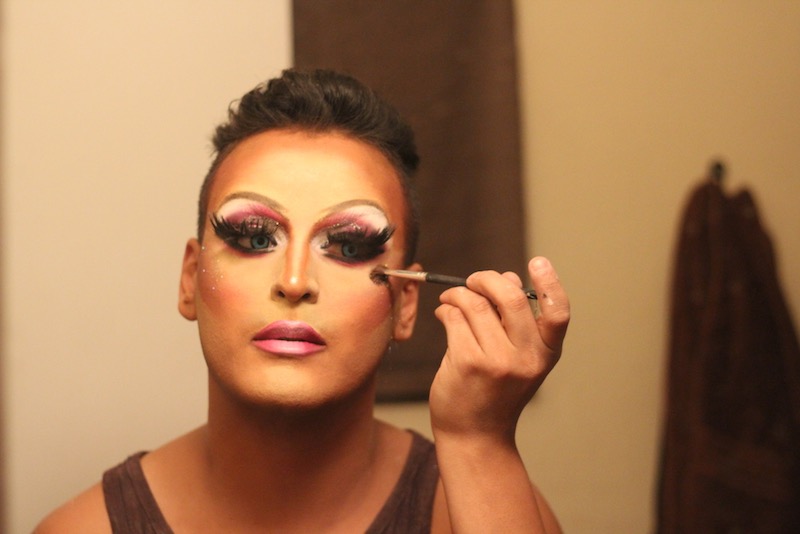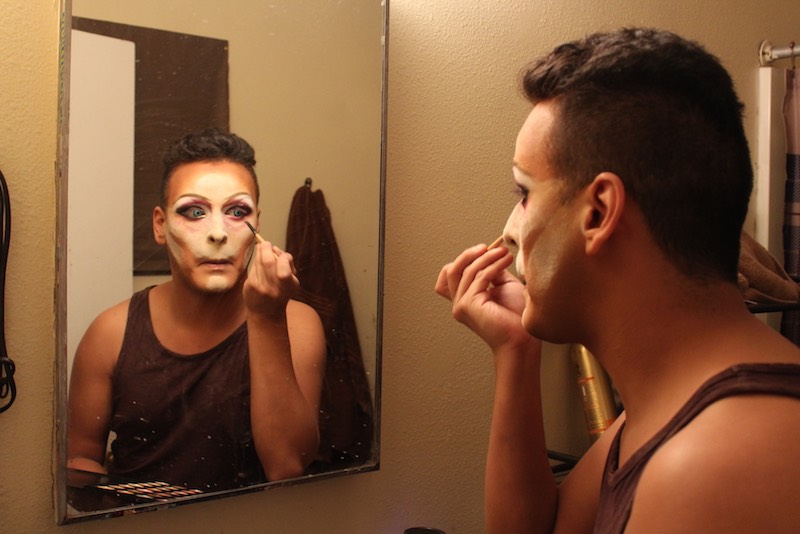
The drag scene at the U.S-Mexico border has continued to illuminate unity and love to a community that’s been dealing with unwanted attention — from migrant families being separated to tougher policing at the border to the arrival of the migrant caravan.
El Paso, otherwise known as the Sun City or El Chuco, has been one of the more politically liberal strongholds in the conservative state of Texas. But it’s the queer community and those aligned with it that have truly made this town friendly and accepting.
Alexander Wright, 27, also known by his stage name, Rumor, is a prominent member of the drag community on the border. His performances have taken him all over the southwest, including Denver, Lubbock, Midland, Las Cruces and Odessa. What started as a weekend pass-time has now turned into a full-time job.
While El Paso is politically liberal, the city’s Catholic roots have remained strong. The current bishop of the El Paso diocese, Mark Seitz, called the 2015 Supreme Court ruling that legalized gay marriage a “tragic” event. But while some community leaders continue to promote divisive messages, Wright and other members of the drag community are focused on spreading unity and acceptance through their performances.
In this interview, Wright explains how his stage persona came about and how unique drag culture is at a bordertown like El Paso.
This interview has been edited for clarity and length.
Antonio Villaseñor-Baca: Can you tell me how you came to be a “drag queen?”
Alexander “Rumor” Wright: I am a drag persona or drag performer. I go by the name of Rumor. I started out doing theatre a couple years ago. And then I had a couple shows where I had to be in drag — I had to be a woman — and I did that and it was something that enticed me to the world of drag, but not really. Because I never expected to be a drag queen. So then one day my friend just put me in drag [clothes] and I ended up becoming Ms. Wright and then Rumor. It used to be every Halloween I was in drag. That’s how it starts with everyone. On Halloween, that’s the night that every little gay boy wants to be a girl.

AVB: What has been the reception to this type of work, especially here on the border?
Rumor: Theater-wise, everyone accepted it. I’m still kind of on the fence about going out in public in drag. Like, I’ll go to the gas station and if I have to [be in drag] that’s fine. But ugh, it’s just something that you never know. I love El Paso. I’ve never had a single issue because I’m there to do a job. Basically, whether you appreciate what we do or not do, we’ll perform for you. Every queen here goes through it. You go through that period where you go like, ‘OK, this is going to be my first time going out in public. What are people going to think of me?’ But you know what? At the end of the day you’re there to entertain. You’re there to be this persona, so you just have to accept it.
AVB: What was it like the first time you did drag? How did your friends and family take it?
Rumor: My friends since high school have been pushing me to do drag, but I never wanted to. I was stuck in theater directing, producing and all that. My family, actually, I would just say like my mom is the only family that I have. I mean, I have a family, it’s just one of those things where you grow up and they end up knowing what you’re going to become, you know, being gay, and they don’t want you around. I’m not upset by it. But I’ve become what I’ve become because my mom has always allowed me to be who I want to be. She’s accepted all the crazy things that I’ve done theatrically so might as well just become a drag queen. So it’s not something out of the norm for her. My dad’s never said anything. He’s like, ‘As long as you make money.’ That’s basically it.

AVB: What’s it like to perform outside of El Paso?
Rumor: Everything is very refined and very polished here [in El Paso]. In Las Cruces, they love it. They eat it up. Because they don’t have the type of community that El Paso does. What I love in Las Cruces is they accept the art, they accept the art form of it. They’re there to be entertained. They accept it because, like I said, they don’t have that community over there like [El Paso.] And then in Odessa and Midland and Lubbock, you’re an out of town girl. All these cities have shown us love, just as we’ve reciprocated it when they’ve come here, too, to visit El Paso.
AVB: How is the drag scene in El Paso unique?
Rumor: Well first of all, we’re in El Paso and Juarez [Mexico]. We’re basically one entity in its own. We’re like a tightknit family. I’m not saying other places aren’t, it’s just that you don’t see a lot of hate crime going on, you don’t see bullying or people being nasty towards each other. Here we actually try to support each other. And the clubs try to work together. Like Pride Square [a string of gay bars in downtown El Paso], each club tries to work together. They try to support not only the queens but also male performers and anyone who is a performer. What makes it unique is that the community of El Paso, here you have the Latina, the Hispanic culture. And it’s very direct so you get to emulate it here. Like you have that going through your blood. You’re able to do Hispanic numbers, which would be accepted here because a lot of the people that attend these shows are Hispanic and they know those songs. They relate to it, they get very into it. It’s an ethereal experience.

AVB: Aside from the music, how else does the Latina culture or influence affect the drag scene?
Rumor: It influences us because we’re born Mexican, we’re born Hispanic. So a lot of us try to do numbers that we can feel. It’s also about the expression that you put into your art. A lot of girls are proud of being Hispanic here, so they love to do those numbers because it’s not only entertaining but also connecting. It’s something that another Hispanic individual would understand. It’s one of those cultural things where you just connect.
AVB: Could you describe the audiences you get and the people that hire you, specifically here in El Paso?
Rumor: Here in El Paso, the club owners are amazing. The show directors have always been super kind to me. I’ve never had an issue with any of them. We’re one community here, so there’s no way of arguing or being petty with each other. And the audiences here are always awesome. Everyone’s been so accepting and they just love it. Everyone knows the girls here. They love each and every one and it’s something that I really admire here in El Paso.
